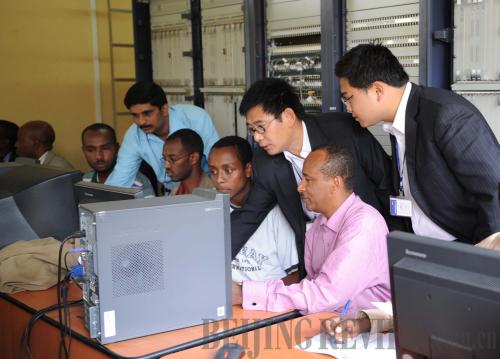|
 |
|
Focused:Chinese ZTE staff mentor Ethiopian engineers (CHEN SHUGEN) |
Every autumn, 28-year-old electronics fan Zhong Datong gets excited. It's the time his favorite annual event, "P&T/EXPO Comm China," the largest international information and communication technology exhibition in Asia, is held in Beijing.
This year the dazzling new products at the booth of the ZTE Corp. were a continued source of fascination for Zhong. Holding the company's latest smart phone and pressing numbers on the touch screen, the veteran electronics fan was thrilled by the product. "It was so ingenious. I didn't even realize it was a Chinese brand. Maybe we can expect that one day we can invent our own iPhone or iPad," Zhong said with excitement.
With its smart phones, solar-powered mobile phones and 7-inch panel computer screens as well as equipment for the integration of telecommunication, TV and the Internet, ZTE is carving its own path through originality and innovation.
Market-oriented innovation
ZTE was established 25 years ago in Shenzhen, China's first special economic zone, in south Guangdong Province. It was then just a 200-employee factory that assembled telephones for foreign companies. In its early days, ZTE earned less than 1 yuan per phone.
However Hou Weigui, President of ZTE, had bigger plans for the company. He was unwilling for ZTE just to do processing for other companies. "Only by mastering core technology through our own innovation can ZTE achieve successful long-term development and compete against international peers," Hou said.
But innovation has risks. Ignoring the demands of the market and churning out products the market doesn't need could just lead to losses. Hou was aware of this from the very beginning. Therefore, ZTE's top priority has always been the market. He calls ZTE's innovation strategy "market-oriented."
Since 1985, ZTE has consistently pursued this strategy. In 1986, China's urban telephone market was dominated by foreign suppliers, but the rural area was still undeveloped. ZTE developed the ZX500, the company's first Digital Program Controlled Exchange (DPCE), a key equipment for telecom networks, successfully breaking into China's rural telephone market, gaining an 18 percent share of the DPCE market.
Nowadays ZTE's hundreds of telecom and mobile products have found their way into over 140 countries. ZTE's 2009 annual report showed a total revenue of 60.27 billion yuan ($9.04 billion), a 36 percent increase over the previous year. Its net profit was 2.46 billion yuan ($369 million), a 48 percent increase over 2008. In 2009, ZTE became one of the top five telecom companies in the world.
ZTE's commitment to independent innovation is evidenced by its investment in R&D. According to documents from China's Ministry of Industry and Information Technology, ZTE ranked first in 2008 and 2009 in R&D investment among domestic electronic and information enterprises. Its annual R&D expenditure represents about 10 percent of total revenue. ZTE also had the most national patent applications in 2009, at 5,719. A report by the World Intellectual Property Organization (WIPO) indicated that ZTE filed 50 percent more global patent applications in 2009 than in the previous year, a greater rate of increase than any other company.
|